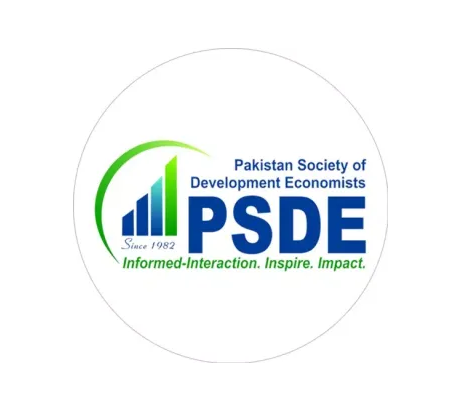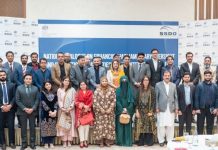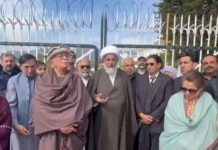ISLAMABAD- APR 17 (DNA):The 38th Annual General Meeting and Conference of the Pakistan Society of Development Economists (PSDE) concluded today in Islamabad, wrapping up three days of dynamic discussions, presentations, and policy dialogues. Hosted by the Pakistan Institute of Development Economics (PIDE) and organized in collaboration with the Ministry of Planning, Development & Special Initiatives (MoPD&SI), the Asian Development Bank (ADB), Pakistan Poverty Alleviation Fund (PPAF), Research for Social Transformation and Advancement (RASTA), CPEC Centre of Excellence, and the Bank of Punjab, the conference brought together a diverse range of scholars, policymakers, economists, and development professionals from across Pakistan and the international community.
The final day featured a high-level keynote panel on “Smart Provinces for a Smarter Pakistan,” where the Guest of Honour, Hon. Senator Mohammad Ishaq Dar, Deputy Prime Minister and Minister of Foreign Affairs, emphasized the pivotal role of provincial governments in shaping Pakistan’s digital future. Drawing from his involvement in the 18th Constitutional Amendment and the 2009 NFC Award, Senator Dar highlighted the need for provinces to demonstrate tangible results now that they hold greater autonomy and fiscal resources. He stressed the importance of digitization at the grassroots level, advocating for smart schools, e-governance, and real-time data systems as essential tools for national development. He called for innovation to be led by provinces, citing examples such as digital agriculture in KP, education reforms in Gilgit-Baltistan, and climate resilience in Sindh. Senator Dar reiterated the urgency of revising the NFC Award and phasing out overlapping federal bodies that contradict the spirit of devolution. He ended his address with a compelling call for collaborative action, stating, “When Pakistan takes flight, every province must lift.”
Also addressing the audience was Minister for Planning, Development and Special Initiatives, Prof. Ahsan Iqbal, who congratulated PIDE for successfully hosting the conference. He stressed the importance of transforming research into action and urged that the conference’s recommendations be synthesized into concrete, implementable policies. Prof. Iqbal encouraged provincial governments to assume active roles in the country’s socio-economic development and emphasized the need to close the gap between “knowing and doing.”
Earlier in the day, the prestigious Mahbub Ul Haq Memorial Lecture was delivered by Mohammad J. Sear, EY MENA’s Digital Government & Public Sector Leader. His lecture, titled “Rethinking Sovereignty in the Digital Age,” challenged traditional definitions of state power in an increasingly digitized world. He argued that in the modern era, sovereignty includes control over data, digital infrastructure, and cyber platforms—areas where global tech giants often wield more power than states. Sear advocated for Pakistan to invest in sovereign digital ecosystems and AI development to safeguard its autonomy and economic future. Chairing the session, Mr. Rana Ihsaan Afzal Khan, Coordinator to the Prime Minister, echoed these sentiments and described data as “the new oil.” He updated the audience on legislative efforts to enable a cashless economy and promote national data governance.
A major highlight of the day was a panel discussion on “CPEC 2.0: Digital Leap – Learning China’s Transformation,” moderated by Dr. M. Muzammil Zia. Experts including Prof. Yuan Li of Shandong University and Dr. Mahmood Khalid of PIDE emphasized the shift from infrastructure-led growth under CPEC 1.0 to innovation and knowledge exchange under CPEC 2.0. Prof. Li outlined China’s successful model of using policy-driven innovation to transform its economy and encouraged similar steps in Pakistan. Dr. Manzoor Ahmad advocated for digitalizing Pakistan’s economy to empower SMEs and boost competitiveness. Mr. Ahmed Masud from Huawei highlighted the success of Huawei’s Islamabad-based global resource center and advocated for deeper Pakistan-China digital collaboration. Other panelists, including Dr. Hassan Waqar of NUST, stressed the need for policy consistency and strong educational governance to achieve digital transformation.
The day also featured multiple parallel technical sessions. In the session on “Digital Disruption: Economic Readiness,” chaired by Mr. Waqas Anwar (MoPD&SI), researchers highlighted Pakistan’s lag in digital infrastructure, education, and regulatory frameworks compared to regional peers. One study projected that comprehensive reforms in these areas could boost Pakistan’s GDP growth by 1.8% annually by 2030. Other presentations emphasized the benefits of digital payments, the importance of financial literacy—especially for women and rural users—and the need to build comprehensive knowledge ecosystems to reach Pakistan’s trillion-dollar economic ambitions.
Another technical session on “E-Governance for Economic Growth,” moderated by Dr. Tallat Anwar, covered mobile banking adoption in Khushab, the potential of blockchain in Islamabad’s real estate market, and the impact of legal frameworks on entrepreneurial ecosystems. The session emphasized tailored digital strategies for rural populations, regulatory reforms, and the need for enhanced international research collaborations.
In the “Digitalization & Industrial Transformation” session, scholars discussed the role of digital inclusion, particularly in underdeveloped regions like South Punjab. The session highlighted weak infrastructure, low digital literacy, and limited governance as key barriers, and called for region-specific policies supported by public-private collaboration.
Another session, “Trade and Commerce in the Digital Era,” explored digital transformation’s impact on trade facilitation, service exports, SME participation in e-commerce, and youth entrepreneurship. One study analyzed the impact of Pakistan’s Fully Automated Clearance System (FCA) and called for more strategic upgrades. Another proposed a Digital Economy Development Index (DEDI) to track digital transformation and service exports. Papers also highlighted challenges in e-commerce adoption due to Pakistan’s cash-based economy and suggested more targeted youth training and inclusive curriculum reforms to promote digital entrepreneurship.
Throughout the day, discussions revealed key insights into the challenges and opportunities Pakistan faces in its digital transition. Despite limitations, there is growing momentum across sectors and provinces toward embracing technology as a driver of growth, inclusion, and resilience.
With over 100 experts participating in more than 20 sessions across three days, the 38th PSDE Conference succeeded in fostering a multidimensional conversation on Pakistan’s digital future. As the event concluded, PIDE reaffirmed its commitment to translating these dialogues into actionable policy frameworks that can drive national progress.

















